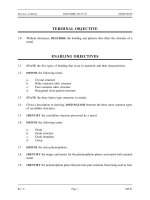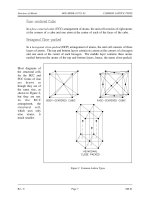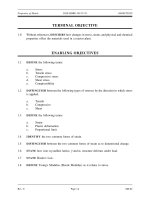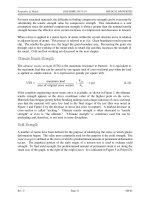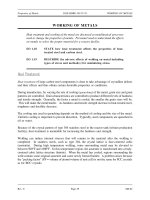Material Science_ Vol 1 of 2 - US DOE (1993) Episode 11 pot
Bạn đang xem bản rút gọn của tài liệu. Xem và tải ngay bản đầy đủ của tài liệu tại đây (9 KB, 2 trang )
Properties of Metals DOE-HDBK-1017/1-93 APPENDIX A
Substituents on aromatic groups that extend the delocalized bonding network are further
stabilizers. Finally, saturated aliphatics are more radiation resistant than those that are
unsaturated; isolated double bonds are readily excited to ions or radicals.
Organic compounds, in order of decreasing radiation resistance, are aromatics, aliphatics,
alcohols, amines, esters, ketones, and acids. Extension to beta radiation is probably reasonable.
In tritium gas, however, substantial differences in irradiation or polymer surface as compared
to bulk can occur. This results from the greater density of tritium (and the much greater range
of the beta in the tritium gas) outside the polymer compared to inside the polymer bulk.
Some direct experience of polymers with tritium has been obtained. Teflon, Viton, or Kel-F
exposure in tritium produces the acid TF, noted as SiF
4
, gas in a glass system. Because of this
acid production, tritium + moisture + Teflon in a stainless steel system at pressures of
approximately 1300 atm caused catastrophic stress corrosion cracking of 0.76-mm thick stainless
steel tube walls in 16 hours. Substituting deuterium for tritium or removing Teflon or moisture
caused no failure. Radiation damage to Teflon is more severe than to all other thermoplastics.
Teflon is therefore not recommended in the presence of concentrated tritium streams.
Surface and bulk effects have been noted in numerous polymer/tritium studies. In one study,
hardening of neoprene occurred throughout the bulk, while hardening of natural rubber primarily
occurred at the surface (crack propagation). Total incorporation of tritium into a polyethylene
powder was found not to be a function of the amount of powder, but of the exposed surface
area. Radiation-induced fluorescence from the surface of high-density polyethylene exposed to
tritium was shown to be orders of magnitude greater than that from the bulk.
Polyimides (good in the presence of gamma radiation) appear good in tritium handling and are
recommended. Vespel stem tips for valves, when used with sufficient sealing force, continue
to seal for several years in tritium (STP). When used with less sealing force, however, leaks
have been noted across valve tips, possibly because of surface hardening. Polyimide gaskets
under constant sealing load are probably adequate for years.
Saturated hydrocarbon mineral oils (for example, Duo-Seal) require frequent changes in tritium
service because of vapor pressure increases (offgassing) and liquid viscosity increases. Silicone
oils are rapidly polymerized or solidified. Polyphenyl ether oils last for years in similar service,
but are expensive and may absorb significant amounts of tritium.
Fluorinated pump oils are not recommended for tritium service and certainly not for tritiated
water vapor service. Tritium fluoride evolution and corrosion may result.
Rev. 0-A Page A-7 MS-02
APPENDIX A DOE-HDBK-1017/1-93 Properties of Metals
Intentionally Left Blank.
MS-02 Page A-8 Rev. 0-A


